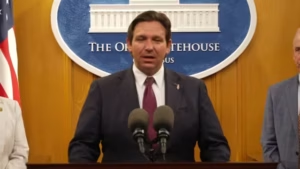In a landmark ruling, a jury has ordered Greenpeace to pay $670 million, challenging the future of political protest and expression among nonprofits.
**Greenpeace’s $670 Million Defamation Ruling Sparks Free Speech Concerns**

**Greenpeace’s $670 Million Defamation Ruling Sparks Free Speech Concerns**
A hefty verdict against Greenpeace raises alarms about potential repercussions for activist organizations and free speech protections.
The environmental advocacy group Greenpeace found itself on the losing end of a staggering $670 million verdict linked to its involvement in protests against the Dakota Access Pipeline. This verdict, handed down this past March in Mandan, N.D., has sent shockwaves throughout activist circles, especially given that $250 million of the damages awarded stemmed from claims of defamation, rather than the protests themselves.
Legal scholars and advocates are expressing grave concerns that such a severe verdict could stifle free speech rights across various nonprofit organizations. David D. Cole, a noted professor at Georgetown Law and former ACLU legal director, stated that the ruling could induce fear among groups like the Sierra Club, N.A.A.C.P., and others who engage in political advocacy. “This verdict will send a chill down the spine of any nonprofit wishing to participate in political protest,” he warned, highlighting the broader implications for civil engagement.
The lawsuit, initiated in 2019 by Energy Transfer, accused Greenpeace of orchestrating a harmful campaign against the company, claiming it orchestrated a “violent scheme” that jeopardized its employees and the project's integrity. Greenpeace, however, countered that it merely supported peaceful demonstrations led by the Standing Rock Sioux Tribe, motivated by concerns for their ancestral lands and water sources.
Central to the jury's decision was a defamation claim against statements made by Greenpeace, which included accusations that Energy Transfer had “damaged at least 380 sacred and cultural sites” during construction work. Greenpeace officials, including interim executive director Sushma Raman, condemned the lawsuit as a direct attack on dissent and a serious threat to the First Amendment rights. “Regardless of political affiliation, we should all be alarmed at the precedent set by this case,” Raman remarked, asserting the need for vigilant protection of free speech.
Legal scholars and advocates are expressing grave concerns that such a severe verdict could stifle free speech rights across various nonprofit organizations. David D. Cole, a noted professor at Georgetown Law and former ACLU legal director, stated that the ruling could induce fear among groups like the Sierra Club, N.A.A.C.P., and others who engage in political advocacy. “This verdict will send a chill down the spine of any nonprofit wishing to participate in political protest,” he warned, highlighting the broader implications for civil engagement.
The lawsuit, initiated in 2019 by Energy Transfer, accused Greenpeace of orchestrating a harmful campaign against the company, claiming it orchestrated a “violent scheme” that jeopardized its employees and the project's integrity. Greenpeace, however, countered that it merely supported peaceful demonstrations led by the Standing Rock Sioux Tribe, motivated by concerns for their ancestral lands and water sources.
Central to the jury's decision was a defamation claim against statements made by Greenpeace, which included accusations that Energy Transfer had “damaged at least 380 sacred and cultural sites” during construction work. Greenpeace officials, including interim executive director Sushma Raman, condemned the lawsuit as a direct attack on dissent and a serious threat to the First Amendment rights. “Regardless of political affiliation, we should all be alarmed at the precedent set by this case,” Raman remarked, asserting the need for vigilant protection of free speech.





















